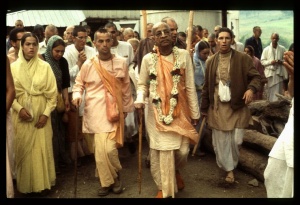SB 4.6.28

A.C. Bhaktivedanta Swami Prabhupada
TEXT 28
- hitvā yakṣeśvara-purīṁ
- vanaṁ saugandhikaṁ ca tat
- drumaiḥ kāma-dughair hṛdyaṁ
- citra-mālya-phala-cchadaiḥ
SYNONYMS
hitvā — passing over; yakṣa-īśvara — the lord of the Yakṣas (Kuvera); purīm — the abode; vanam — the forest; saugandhikam — named Saugandhika; ca — and; tat — that; drumaiḥ — with trees; kāma-dughaiḥ — yielding desires; hṛdyam — attractive; citra — variegated; mālya — flowers; phala — fruits; chadaiḥ — leaves.
TRANSLATION
While traveling, the demigods passed over the forest known as Saugandhika, which is full of varieties of flowers, fruits and desire trees. While passing over the forest, they also saw the regions of Yakṣeśvara.
PURPORT
Yakṣeśvara is also known as Kuvera, and he is the treasurer of the demigods. In the descriptions of him in Vedic literature, it is stated that he is fabulously rich. It appears from these verses that Kailāsa is situated near the residential quarters of Kuvera. It is also stated here that the forest was full of desire trees. In Brahma-saṁhitā we learn about the desire tree which is found in the spiritual world, especially in Kṛṣṇaloka, the abode of Lord Kṛṣṇa. We learn here that such desire trees are also found in Kailāsa, the residence of Lord Śiva, by the grace of Kṛṣṇa. It thus appears that Kailāsa has a special significance; it is almost like the residence of Lord Kṛṣṇa.